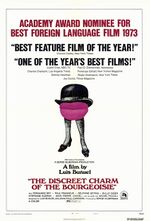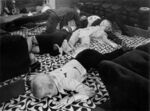The Discreet Charm of the Bourgeoisie
The Discreet Charm of the Bourgeoisie (English title for a French movie[1]) is a documentary by famed surrealist filmmaker Luis Buñuel (Noticeably not French, probably Mexican). The documentary explores an unusual and unexplained phenomenon where the Upper class are consistently unable to enjoy a nice dinner with friends. Buñuel, a man sympathetic to the plight of the rich, heard about the phenomenon and was quoted as saying, "Hey, that's like one of my movies"[2]. After finding suitable subjects, he proceeded to film their experiences with this peculiar occurrence. Not only that, it is the first film to capture actual dreams. Wes Craven later stole this concept for his 1984 documentary A Nightmare on Elm Street. Although, that film is about the plight of janitors and no one gives a fuck about those things.
Plot[edit]
Buñuel follows the lives of six rich friends who must cope with the inability to have a simple dinner together. Among the group is famed ambassador of Miranda, Fernando Acosta, and his friends M. Thevenot and his wife Simone. Also with them is Simone's sister Florence, a wealthy woman whose name has become synonymous with drunken tabloid stories. The first instance of this phenomenon occurs when the group arrives at the Senechal residence, where they are greeted by the lady of the house, Alice. At first it appears to be a scheduling mistake; undaunted, they try to salvage their night by going out to eat. Instead they attend a funeral, where they are once again denied their dinner. Occurrences similar to this plague the group as they further attempt to sit down for a meal together continue to impede them. Some that baffle people studying the phenomenon to this day.
Another party is impeded when Alice and her husband Henri are overcome with an insatiable lust, which puts the group on edge and dash hastily out to avoid the same effect. Even in separate groups these poor affluent people are cursed to starve like the filthy poor. Such as Alice, Simone, and Florence's experience in a teahouse where they have nothing to drink. Although the waiter might be fucking with them. Anything to screw over the rich. Bastard. Later, the French military shows up at the Senechal house in hopes of joining them for dinner. The next night they are revealed to be on a stage, where they are further humiliated. As it turns out, this is one of the few scenes in the film that isn't a dream. Either way, the group admirably pushes forward trying to have that meal they desire so badly.
Throughout the film, Buñuel brings the audiences into the lives of his lovable subjects. Along with the dinner phenomenon, Fernando Acosta is plagued with his own political troubles. Although Miranda is a beautiful country, a terrorist anarchist group has their sights set on him. Set for death! In a tense stand off and attempted seduction, à la James Bond style, the suspect is apprehended. He was probably a little bitter about not buttering her muffin. As well as his valiant efforts to bring medicine to the Miranda people, in the form of lifesaving cocaine.
The group is however tragically cut down during one of their ill attempted dinners. As the anarchist group takes over the dinner party, the guests are viciously and heartlessly gunned down. More victims of terrorism. WHY GOD?! WHY!!!
The documentary is intercut with scenes of the group walking down an abandoned road. Reflections of the happier times, and their memory.
Production[edit]
The production of the film was discovered to be one fraught with turmoil complications. Both Buñuel and his subjects would clash frequently during filming.
Pre-Production[edit]
Buñuel is quoted as saying about the phenomenon, "Hey, sounds like something I would make"[3]. So he set about finding the perfect subjects. To find his group he spent his time enjoying the perks of high society rubbing elbows with the best of the best. When criticized for wanting to make a film about people that otherwise suffer from nothing, Buñuel stated, "I made Los Olvidados, I don't have to care anymore"[4]. And it was so. Once he found a suitable crew to roll with, he started filming their experiences.
Production[edit]
Buñuel was known for being a difficult man to work with. And after his first documentary, the wonderfully satirical Las Hurdes, he has gained a reputation for messing with the documentary form. It is believed that certain points have been staged, such as the scenes of the group walking down the abandoned road. According to the Mirandan ambassador, Buñuel abandoned the group on this desolate road and made them walk back. Buñuel had hidden cameras set up to capture them walking. The film also gained notoriety for the illicit affair between Florence and Luis Buñuel. The two bonded over their love of booze, especially Florence's who spent more time in the day drunk than sober. One thing led to another, one martini led to five and the two began shacking up. Buñuel although not a very sexual man is quoted as saying, "I still got it, might as well use it".
Post-Production[edit]
Although Buñuel has been known to mess with the documentary format, the terrorists coming in was not planned. Although he was a man with a sordid past, he tended not to associate himself with people like this. Although it is believed the sudden intrusion of the Mirandan anarchist group partly inspired the terrorism depicted in his final film That Obscure Object of Desire. But when the terrorist group stormed the party, he fled before the carnage commenced leaving his subjects behind. It was after filming that it was discovered they were killed. Buñuel when questioned about this incident said, "Surrealist, Mexican, and French, I guess its time to enter a new phase". He immediately went into hiding after the incident and returned once the heat had died down. His subjects are still fondly remembered.
Reception[edit]
I guess it was pretty popular. It's certified fresh on Rotten Tomatoes with a 98%, the definitive in movie reviewing websites. With such acclaim it became a clear choice as an Oscar contender. Gaining nominations in the Best Foreign Language Film and Best Writing categories. Luis Buñuel was a huge fan of the Academy Awards, and the culture surrounding awards season. He is credited for throwing the best Oscar parties like ever. Societies elite have typically been seen stumbling out of his home after the parties. When asked about the festivities guests have said, "Like OMG, you have no idea"[5]. So when it was time for Luis Buñuel to attend as a nominee, Buñuel was more than prepared to be honored.
The Discreet Charm of The Bourgeoisie won Best Foreign Language Film to Buñuel's great excitement. Buñuel, known for his humility, proceeded to rub his win in the face of the other nominees. Proudly proclaiming, "Suck it losers!". He was met with the evil eye by the majority of the crowd, but he did not care; he just won an Oscar. It was the Best Writing category that led to some misfortune. Buñuel prematurely stood up ready to hear his name announced, only to hear Jeremy Larner's instead for The Candidate. Furious, Buñuel screamed, "Who the hell is Jeremy Larner?!" as he stood up to receive the award. Buñuel tripped Larner as he walked towards the stage and stormed out. He has loathed the Academy Awards since then until the day of his death. Jeremy Larner's death, that is.
Legacy[edit]
The impact could be seen both in the film world as well as culturally. The Bourgeoisie was a class often looked at with contempt. With this film, people saw that there was no difference between them and everybody else, except that the Bourgeoisie was just richer. Richer than God. A statue of Buñuel was erected in honor of this film as well as his many others, but mostly his enormous head. Originally, there was going to be a different statue meant to commemorate the victims of his subjects within the film, but the public thought this statue was a better idea. It would not be as much of a downer.
The film brought a great amount of exposure to this problem. It was an issue many were afraid to discuss, but Buñuel's film brought into the public sphere. Since then numerous studies have been launched to try to discover what causes it and how to end it. All studies have yielded no answers. Several charitable orginizations have been set up to help the wealthy sufferers of the affliction and combat its devastating effects. Groups such as "Brisket for the Bourgeoisie" and "Lobster for The Loaded" are two of the most famous groups. The abandoned road the group walks has also become a popular spot. Tens of people, both sufferers and tourists looking to say they did it, walk the road in honor of the group in the film.
Footnotes[edit]
| Avatar (2009) ♦ Bob the Sperm (1996) ♦ Braveheart (1955) ♦ Dawn of the Dead (1978) ♦ Debug (2014) ♦ The Discreet Charm of the Bourgeoisie (1973) ♦ Dracula: Dead and Loving It (1955) ♦ Dumb and Dumber (1994) ♦ The Greatest Disasters of Our Time (2006) ♦ I Can't Believe It's Not Butter (2006) ♦ March of the Penguin Brothers (2005) ♦ Night of the Living Dead (1968) ♦ No Pressure (2010) ♦ Police Academy (series, 1984–) ♦ Tremors (1987) ♦ Ultra Light Me (2014) ♦ Underworld (2003) ♦ The Wizard of Oz (1944) |







